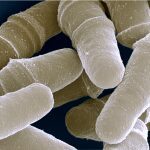Link to Pubmed [PMID] – 31315658
Epigenetics Chromatin 2019 07;12(1):45
Cellular quiescence is a reversible differentiation state during which cells modify their gene expression program to inhibit metabolic functions and adapt to a new cellular environment. The epigenetic changes accompanying these alterations are not well understood. We used fission yeast cells as a model to study the regulation of quiescence. When these cells are starved for nitrogen, the cell cycle is arrested in G1, and the cells enter quiescence (G0). A gene regulatory program is initiated, including downregulation of thousands of genes-for example, those related to cell proliferation-and upregulation of specific genes-for example, autophagy genes-needed to adapt to the physiological challenge. These changes in gene expression are accompanied by a marked alteration of nuclear organization and chromatin structure.


